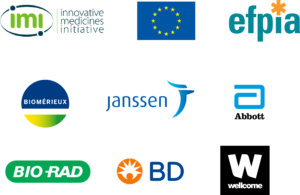 VALUE-Dx is working on identifying the optimal tests that can diagnose reliably all patients with specific Community-Acquired Acute Respiratory Tract Infections (CA-ARTIs). WP1 conducted a systematic review and meta-analysis of point-of-care diagnostic test accuracy (DTA) for CA-ARTI including Rapid Antigen Detection Technique (RADTs), Nucleic acids amplification tests, imaging techniques, signs and symptoms, and host biomarkers. The performance of several pathogen-based RADTs to define the aetiology of CA-ARTI was investigated. Influenza virus, Respiratory Syncytial virus (RSV) and group A Streptococcus (GAS) RADTs showed a good DTA with an AUC >80%. Sensitivity and specificity differed depending on patient population (children and adults), brand name and test type; in particular, immunochromatographic assays were the most represented with a high DTA (AUC >87%). No significant heterogeneity rises for subgroup analysis by type of setting (community care, ED, LCTF). PCR tests proved very useful to exclude the diagnosis of CA-ARTIs with a very good sensitivity (80-98%) and high specificity (94-99%) and to reduce inappropriate antibiotic usage. Lung ultrasound showed also excellent diagnostic efficiency tool for the diagnosis of bacterial CAP (AUC 94%).
VALUE-Dx is working on identifying the optimal tests that can diagnose reliably all patients with specific Community-Acquired Acute Respiratory Tract Infections (CA-ARTIs). WP1 conducted a systematic review and meta-analysis of point-of-care diagnostic test accuracy (DTA) for CA-ARTI including Rapid Antigen Detection Technique (RADTs), Nucleic acids amplification tests, imaging techniques, signs and symptoms, and host biomarkers. The performance of several pathogen-based RADTs to define the aetiology of CA-ARTI was investigated. Influenza virus, Respiratory Syncytial virus (RSV) and group A Streptococcus (GAS) RADTs showed a good DTA with an AUC >80%. Sensitivity and specificity differed depending on patient population (children and adults), brand name and test type; in particular, immunochromatographic assays were the most represented with a high DTA (AUC >87%). No significant heterogeneity rises for subgroup analysis by type of setting (community care, ED, LCTF). PCR tests proved very useful to exclude the diagnosis of CA-ARTIs with a very good sensitivity (80-98%) and high specificity (94-99%) and to reduce inappropriate antibiotic usage. Lung ultrasound showed also excellent diagnostic efficiency tool for the diagnosis of bacterial CAP (AUC 94%).
In addition, WP1 is involved in developing a roadmap to provide recommendations for future development, implementation, and increased uptake of CA-ARTI diagnostics. The roadmap will address short-term and long-term goals and aims to provide key information to help diagnostic innovators and funders prioritize investment decisions. To improve antibiotic use in CA-ARTI by diagnostics, it is essential that these tests meet the user requirements. WP1 is therefore also developing user requirement specifications in line with ongoing and published global efforts to determine Target Product Profiles for diagnostics addressing the antibiotic resistance challenge.


